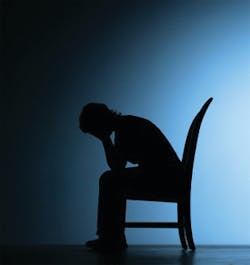Seven days underpaid, gotta give it up;
Got no time for this life that I'm livin' up;
Shackled down, kicked around, now slave to the grind;
Need some time for myself.
Lyrics from “Not Enough” by 3 Doors Down
Ever feel like this?
I do! I wish it wasn’t true, but it is. Mike always knows when this is happening to me because he will get into my car and find the radio tuned in and turned (way) on grungy, raw, alternative rock that goes to really dark place (like my beloved 3 Doors Down does so well!). He also knows when he hears this that my job is taking a toll on me emotionally, and the intensity of my clientele is challenging, angry, and conflictual with issues that are heavy. When work gets deep I need a release and I often find this in music that reflects the emotions I am taking on.
It can be very energizing at times but also challenging, draining, sometimes painful and often hard on me to be a professional psychotherapist. Everything I do is behind closed doors for ethical and legal reasons. It is always about the people in my office and I am taught to leave my personal self outside the walls of my office, so it always means being in a good mood, focused, and ready to concentrate on the person or couple in front of me. “You’re job is easy… all you have to do is listen to people talk all day” is what some may think, but try listening to a person who is in crisis for 45 minutes, remembering every important detail, keeping it all about them, guiding them through the emotions so that they can have a cathartic release that prompts personal insight and healing, and pointing out how their thought process may be hurting them. This, in essence is what I repeat every hour up to 10 times a day and every time my client feels, I feel right along with them
Now I am a seasoned professional, a veteran since 1990 in a career that, according to the NASW (National Association of Social Workers), the average practitioner will leave after only 10 years & 2 months. I know how to detach from my emotions and leave them behind. Every night I close my office door and lock it; the locking of the door symbolizes in my mind, body, and soul to also leave what happens behind that door behind it. I am trained not to let it affect me and I am legally bound to not talk about it. It is a career built upon silence as my profession holds confidentiality and respect for the client as sacred. It is preeminent in our code of ethics and it is a value we willingly fight to maintain. We gladly are the keepers of our clients’ secrets.
However, today I woke up and realized I am experiencing burnout. I know this because I am dragging emotionally and physically. Being around people in my personal life is off putting and takes more energy than normal. I don’t want to hear anything negative from anyone. I’ve heard enough. Instead I would rather seek solitude in a good book, take many walks with the rescue pup Wilson, or just putz around the house. I do not want to put myself in the position of anyone in my personal world telling me about what is troubling them or seeking advice, or in any position where someone needs something from me emotionally. I listen all day as a professional and sometimes just don’t have the capacity to listen to one more thing. I am literally full and have nothing more to give to anyone, not even myself because I am giving too much as a professional caretaker of others.
I also feel this as a heavy weight that feels like a burden inside of me. I feel like I am dragging inside, down to my core. I am naturally an energetic person who thrives on productivity, being successful, and striving for perfection in whatever I do. I love new challenges and I hunger to learn new information, but when burnout sets in apathy begins to set in also. I start looking for days I can sleep in, thinking sleep will restore me. My mind will begin to feel sluggish and unfocused. I become more distracted and tasks around the home get started but I don’t have the stamina to finish them. I start to gravitate towards my “Magic Chair” (as described by Kevin Gilmartin in his book “Emotional Survival for Law Enforcement: A Guide for Officers and Their Families”… yes, non-cops can have “Magic Chairs” too!) I will watch TV with my animals surrounding me, Mike on the other end of the sectional, watching mindless TV as I surf the Internet. It’s an easy place to go, and one that takes serious intentionality to recognize and climb back out of. And climbing out of it is essential or it can become a way of life hurting all of those around us.
And, as it often happens, Mike is experiencing some of this too. Mike is a very laid back individual who is naturally positive and sees the good in others. He loves to see people succeed and he pushes himself to excel at work because he LOVES his job and cannot imagine doing anything else. He loves that he gets to put on his uniform and has the privilege to serve and protect. For him, being a LEO is a calling that he received as a young boy and, to him, doing his job at the agency he works for is one of the highlights of his life. However, as with anyone else, professional burnout is going to strike when he does not take time for himself.
The first sign for Mike is he starts to get more easily snippy, snappy, and feisty with people who he is there to serve and protect. It starts off very slightly and is hardly noticeable, but his “irritation with the stupid” begins to build at work and spills over into his personal life; the next thing he knows he is slamming a golf club on a fairway after the shanking what he envisioned would be the perfect pitch onto the green. The routine imperfections with life that are usually enjoyable, funny, or humorously memorable begin to have the effect of “Really??? Again, really???” He begins to feel worn out from the inside out.
Fortunately, for both of us we know the signs. We were trained in this at our first real job out of college when we worked at a residential facility for behavior-disordered teens. It was a stressful job (and one that was often more dangerous and unpredictable than the jobs either of us do today). We learned the skills to leave work at work and to blunt the emotions from carrying over into our personal lives. Unfortunately, however, as is true at the moment, sometimes the healthy defensive walls are cracked, chipped, or starting to crumble and the emotions begin to affect who we are outside of work. This is when we know we need to be intentional about recognizing, reversing, and engaging all of our resiliency skills to put it behind us before it becomes a part of our daily lives.
Professional burnout is a usual and customary response in any profession where a person has the opportunity to give too much of their personal self at the job. It is characterized as a state of emotional, physical, and mental exhaustion caused by excessive and prolonged stress. It begins to reduce your productivity leaving you feeling cynical and resentful until eventually, if not reversed, it will make you feel like you have nothing more to give. This can be a dangerous place for a LEO to stay too long.
Describing our experience with burnout isn’t intended to be self-indulgent – it is to let you know we understand and can empathize. It is to explain our experience to see if you can relate. Fighting burnout is a critical survival skill for a police officer that is often overlooked. In our next article we will look at skills to better identify and reverse burnout.
Web Links:
About The Authors:
Althea Olson, LCSW and Mike Wasilewski, MSW have been married since 1994. Mike works full-time as a police officer for a large suburban Chicago agency while Althea is a social worker in private practice in Joliet & Naperville, IL. They have been popular contributors of Officer.com since 2007 writing on a wide range of topics to inlude officer wellness, relationships, mental health, morale, and ethics. Their writing led to them developing More Than A Cop, and traveling the country as trainers teaching “survival skills off the street.” They can be contacted at [email protected] and can be followed on Facebook or Twitter at More Than A Cop, or check out their website www.MoreThanACop.com.



